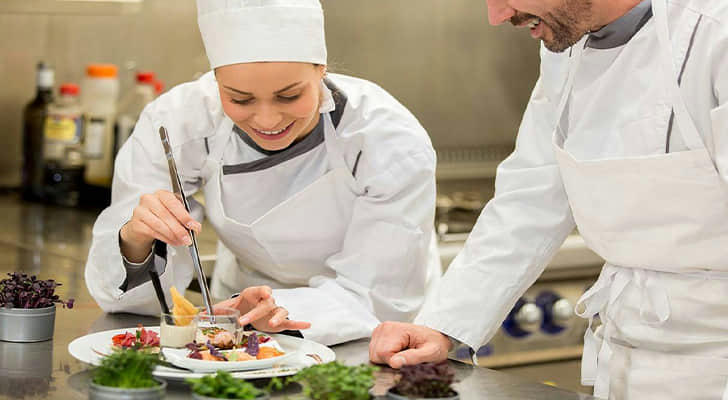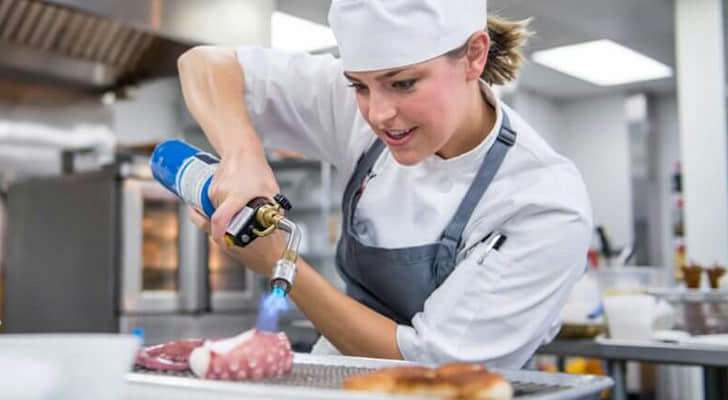How to Become a Chef: Your 4 Step Path to Culinary Success

Food isn’t just sustenance; it’s an art form that plays a vital role in our cultures. Imagine using fresh ingredients and kitchen tools to craft dishes that not only taste amazing but also tell a story. That’s what being a chef is all about.
While anyone can claim the title of "chef," true culinary mastery is achieved through years of dedication and learning. Think of icons like José Andrés, David Chang, Julia Child, and Anne-Sophie Pic, who have transformed the culinary world with their creativity and passion.
To start your journey toward becoming a skilled chef, follow these four key steps: gaining education, undergoing training, obtaining certification, and accumulating experience. This guide will walk you through each of these steps, providing you with the foundation you need to build a successful career in the culinary arts.
A Chef’s Role: Essential Duties and Responsibilities
Chefs handle a diverse range of responsibilities, each crucial to the success of a kitchen or restaurant. Their daily tasks can vary widely based on their role, the size and structure of their team, and their level of involvement in overall restaurant management. Here’s a closer look at what a chef’s job typically involves:
Meal Preparation: Chefs prepare and cook dishes, ensuring they meet high standards of taste and presentation. They use their culinary skills to create a variety of meals, from everyday dishes to elaborate culinary creations.
Menu Design: Chefs design and plan menus, crafting selections that reflect their culinary style and meet the preferences of their customers. They often update the menu to include seasonal ingredients or new trends.
Ingredient Sourcing: Chefs are responsible for sourcing high-quality ingredients from suppliers. This involves selecting fresh produce, meats, and other essentials that meet the restaurant’s standards.
Creating Unique Dishes: Innovation is key. Chefs develop new recipes and dishes that set their restaurant apart, experimenting with flavors and presentation to keep the menu exciting.

Kitchen Management: Chefs oversee kitchen operations, managing staff, and ensuring that all cooking procedures are followed. They create a productive work environment, coordinate tasks, and maintain efficient workflow.
Inventory and Supply Ordering: They handle inventory management by ordering and maintaining stock of ingredients and kitchen supplies, ensuring that everything needed is available and properly stored.
Food Safety Compliance: Ensuring that all food safety standards and regulations are met is a critical responsibility. Chefs implement procedures to keep food safe and hygienic.
Supervising Hygiene Practices: Chefs monitor and enforce hygiene practices among kitchen staff to maintain a clean and sanitary cooking environment.
Customer Interaction: In many restaurants, chefs engage with customers, receive feedback, and adjust dishes or menus based on customer preferences.
Quality and Consistency Assurance: Chefs are responsible for maintaining high standards of food quality and consistency across all dishes served.
Restaurant Promotion: They may also participate in promoting and marketing the restaurant, using their expertise to create appealing dishes that attract and retain customers.
Financial Management: Managing finances, including budgeting and controlling food costs, is often part of a chef’s role, especially in higher-level positions.
Continuing Education: To stay current with culinary trends and techniques, chefs often pursue ongoing education and training, attending workshops or classes to refine their skills and knowledge.
Becoming a Chef: A Comprehensive Guide

While there isn't a single path to becoming a chef, there are several key steps that can help you succeed in this dynamic career. Here’s how to get started:
1. Cultivate a Passion for Cooking
Loving to cook for yourself and your loved ones is different from working in a professional kitchen. As a chef, you'll need to prepare dishes for paying customers who expect high-quality meals. A genuine passion for food should include an interest in various cuisines and a willingness to learn new techniques and adapt to food trends.
2. Gain Restaurant Experience
Experience in a restaurant is crucial. Understanding how a kitchen operates and working well with colleagues under pressure is essential. Start in any role, whether it’s bussing tables or preparing simple dishes, to get a feel for the restaurant environment. Working in different types of restaurants, from chain establishments to local eateries, will give you a broad perspective on the culinary field and help you develop your skills.
3. Obtain a Culinary Arts Degree or Certificate
While not strictly necessary, a degree or certificate in culinary arts can enhance your resume and improve your job prospects. Enrolling in a respected culinary program can deepen your knowledge and refine your skills. Look for programs that cover various aspects of cooking, such as baking, international cuisines, restaurant management, and menu development. This formal education will provide a strong foundation for your culinary career.
4. Work Your Way Up
Becoming a head chef usually involves starting at lower levels, such as a kitchen assistant or line cook. Gaining experience and proving your skills is essential for advancing to higher positions like sous chef and eventually head chef. Patience and a willingness to learn from more experienced professionals are key to climbing the culinary career ladder.
5. Explore Nontraditional Roles
Not all chefs work in traditional restaurant settings. Opportunities exist on cruise ships, at theme parks, in school cafeterias, and in corporate dining facilities. Chefs can also work in food labs, develop new menu items or recipes, or even start their own catering businesses. Exploring these nontraditional roles can offer diverse and exciting career options.
By following these steps and continuously honing your skills, you can build a successful career as a chef.
Chef Salaries, Career Outlook, and Professional Development
•Career Outlook for Chefs
The U.S. Bureau of Labor Statistics (BLS) anticipates a robust job market for chefs and head cooks, with employment expected to grow by 5% between 2022 and 2032, surpassing the 3% growth rate for all occupations. Chefs typically earn a higher-than-average salary, with a national median income of $56,520 annually.
Salaries can differ based on factors such as industry, location, and experience level. For instance, Hawai‘i offers the highest median annual salary for chefs and head cooks at $83,600, followed by Rhode Island with a median of $81,070.
•Certifications for Career Advancement
While not required, certifications can enhance a chef’s qualifications and appeal to prestigious establishments. Key certifications include:
American Culinary Federation (ACF): The ACF offers several certifications, including the esteemed Certified Master Chef®. Other ACF certifications include:
Certified Fundamentals Cook®
Certified Culinarian®
Certified Sous Chef®
Certified Chef de Cuisine®
Certified Executive Chef®
Certified Pastry Culinarian®
Certified Working Pastry Chef®
Certified Culinary Educator®
Retail Bakers of America (RBA): RBA certifications include Certified Journey Baker, Certified Journey Decorator, Certified Baker, Certified Decorator, and Certified Master Baker.
National Restaurant Association (NRA): The NRA provides ServSafe certifications, such as ServSafe Manager and ServSafe Food Handler, focusing on food safety and managerial skills.
•Professional Organizations for Chefs
Being part of professional organizations can broaden your culinary expertise and expand your network. Notable organizations include:
American Culinary Federation (ACF): A long-standing organization dedicated to promoting the professional status of chefs, offering training, apprenticeships, and a range of certifications.
International Association of Culinary Professionals (IACP): This organization serves a diverse array of culinary professionals and offers awards and educational programs to support their development.
Bread Bakers Guild of America (BBGA): The BBGA focuses on high-quality baking practices and supports the personal and professional well-being of bakers.
National Restaurant Association (NRA): The NRA advocates for the restaurant industry, hosting the National Restaurant Association Show and providing educational and networking opportunities.
Women Chefs and Restaurateurs (WCR): This organization aims to support and elevate women in the culinary industry, addressing the underrepresentation of women in chef roles and creating a platform for their advancement.
FAQs About Becoming a Chef

•What is the typical timeline for becoming a chef?
Becoming a chef can vary in timeline depending on your approach. If you have the resources to start your own restaurant or catering business, you could technically become a chef immediately. However, gaining true respect and recognition in the culinary world typically requires several years of hands-on experience, training, and progressively working up through various kitchen roles.
•What are the steps to beginning a career as a chef?
Starting a career as a chef usually involves gaining experience in a restaurant setting. No job is too minor; even entry-level positions offer valuable learning opportunities. Working alongside experienced professionals in a kitchen will help you acquire essential skills and insights into the culinary industry.
•Do chefs earn a good salary?
Chefs can earn a respectable income, especially as they gain experience and advance in their careers. The median annual salary for chefs is around $50,520, according to the Bureau of Labor Statistics (BLS), which is higher than the national median salary of $46,310 for all occupations.
•What responsibilities does a chef have?
A chef’s responsibilities cover both detailed tasks and broader management duties. On a detailed level, chefs handle ingredient sourcing, meal preparation, and menu design. On a larger scale, they may manage kitchen staff, promote the restaurant, and oversee financial aspects of the operation.
•What does a typical workday for a chef involve?
Chefs often work long hours with limited breaks. Their day may begin early, even in restaurants that serve only dinner. Typical duties include preparing ingredients and kitchen tools, cooking dishes, cleaning the kitchen and dining areas, conducting staff meetings, and interacting with customers and investors.
